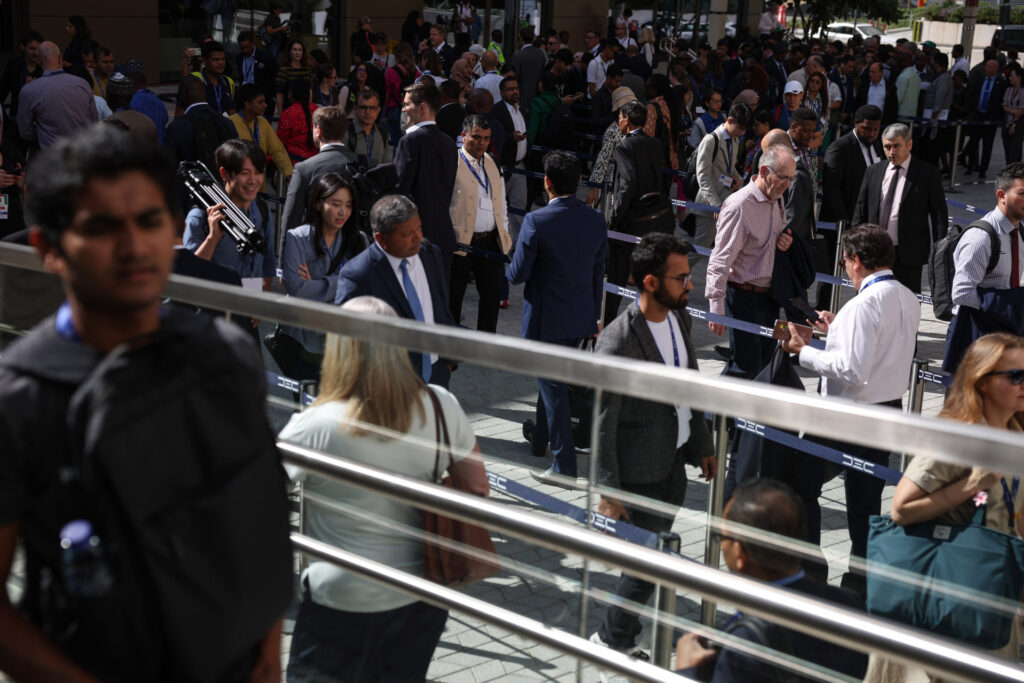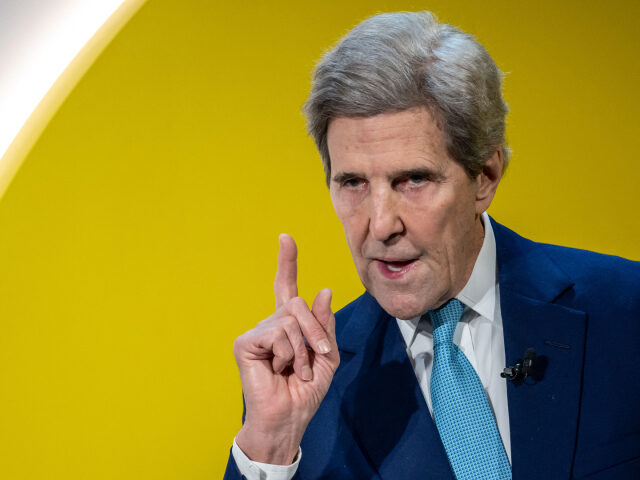Former Senator John Kerry, climate envoy for the Biden administration, scolded the world for not making enough sacrifices to fight climate change at the COP28 climate conference in Dubai on Wednesday.
“There’s too much business as usual still. We have got to bring people to the table who are not yet there. And we will make progress in that,” Kerry said.
“Not everybody is doing what they promised to do. And needless to say, that’s a problem and we need to have accountability at this COP, for that lack of follow-through by some,” he lectured.
Kerry said the world – by which he presumably means the Western world, since the developing world has made it clear that climate change is purely a Western problem – will “need to step up and help get the job done at a faster rate.”
Kerry said this will require “trillions of dollars” in new spending, which is a problem because there are no more trillions of dollars to spend. The United States is teetering on the verge of fiscal apocalypse from irresponsible government spending, other Western powers can no longer conjure trillions from thin air with debt-fueled spending binges, China thinks it already spends enough on green energy, and the Global South flatly refuses to go broke for climate change.
Other climate activists gathered at COP28 echoed Kerry’s criticism of world governments taking “baby steps to avert the climate crisis,” as U.N. Climate Change executive secretary Simon Stiell put it.
The problem is that most citizens of the developed world hardly think the sacrifices and titanic prices they have paid thus far are merely “baby steps.”
The dirty secret of the Paris Climate Accords is that meeting their emissions targets – which have a debatable link to the planetary climate – would require re-primitivizing the West on a massive scale, far beyond anything the climate change movement wants to explicitly ask of voters. The non-Western world simply will not shut down its budding industries or pay extravagant prices for less reliable “green energy” to ease the burden on the older industrialized nations.
South Africa, for example, is already experiencing rolling blackouts, and it cannot come close to its “net zero” carbon emission targets, although President Cyril Ramaphosa keeps promising to try. When developing nations talk about “climate justice,” they mean rich Western nations transferring wealth to them, not their own people agreeing to live in darkness and poverty.
Politicians in rich Western nations are happy to make those funding transfers because it increases the power of their governments, but their ability to print money for environmental spending has been stretched to the limit. No Western government is willing to start cutting expensive social programs to free up money for climate change and if they keep printing money on the scale Kerry envisions, their populations will revolt against skyrocketing inflation.
Even Kerry seemed aware of the harsh fiscal realities because, like other COP28 elites, his specific suggestions were focused on reducing methane – the new celebrity superstar gas of the climate change movement.
Kerry noted that reducing methane emissions is “the easiest, quickest, fastest, cheapest way to begin to get gains in against the warming.” Methane can be reduced by improvements to oil and gas production that are relatively affordable, compared to the other demands of the climate movement.
Western taxpayers may wonder why the trillions they have spent so far have not gotten any “gains in against the warming.”
Writing at the Washington Examiner on Tuesday, author Steve Goreham noted the extravagant jet-setting lifestyles of climate crusaders like Kerry are beginning to annoy a public that is endlessly told it has not sacrificed enough, and the public has also noticed that 28 years of incredibly expensive COP climate conferences and green energy programs have not affected the Earth’s climate or atmospheric composition very much:
There is little evidence that the annual COP climate conferences held over the last 27 years have had any effect on the climate. Data from the National Oceanic and Atmospheric Administration show that the concentration of carbon dioxide in our atmosphere continues to rise steadily. In 2020, global industrial emissions of CO2 declined by more than 8% during the COVID-19 crisis, but this decline was undetectable in the rise in atmospheric CO2.
Nor has there been any significant change in energy consumption. World energy consumption has tripled since 1965. From 2004 to 2021, the world spent about $5 trillion to promote renewable energy and installed more than 300,000 wind turbines. But in 2021, coal, oil, and natural gas provided 81% of global energy consumption, the same percentage as in 1999. The COP climate conferences can best be characterized as futile.
One thing rising faster than world energy use is COP attendance. About 5,000 attended each of the first five COPs, but this rose to more than 27,000 for COP15 in Copenhagen and more than 30,000 for COP21 in Paris. This year’s conference may have more than 70,000 attendees, but “the sky’s the limit” for future attendance at this carbon dioxide-emitting event.

Attendees queue to enter the Blue Zone on day two of the COP28 climate conference at Expo City in Dubai, United Arab Emirates, on Friday, December 1, 2023. (Annie Sakkab/Bloomberg via Getty)
In this sense, the climate movement is a victim of its own rhetoric: by endlessly screaming that time has run out, the crisis has never been worse, and the time for “baby steps” is over, climate activists naturally invite the question of what happened to the trillions already spent by Western taxpayers, why none of their sacrifices seem to make any difference, and why the political elites are not joining them in making those sacrifices.
The real crisis facing the climate change movement at COP28 is that further progress toward its goals will require governments to start making sacrifices. The political class will have to start digging into its pockets, instead of just ordering others to spend more. If running up more debt is not an option, the next billions of climate spending will have to start coming out of social programs, slush funds, and government agency budgets. Aristocrats like John Kerry might have to start reducing their personal carbon footprints. They will have to tell their constituents to give up popular subsidy and welfare programs to free up funding for climate change.
The Western political elites simply are not ready to begin making the kinds of sacrifices it demands of the private sector, and their voters will rebel if told they must adopt low-energy no-meat lifestyles while climate envoys soar overhead in private jets to attend climate conferences.

A grasshopper burger topped with dried grasshoppers and mealworms is seen June 4, 2014, during a global Pestaurant event sponsored by Ehrlich Pest Control, held at the Occidental Restaurant in Washington, DC. For one day only, pop-up Pestaurants will appear in cities across the Globe to offer sweet and savoury edible insects, grasshopper burgers and much more. (KAREN BLEIER/AFP via Getty Images)

COMMENTS
Please let us know if you're having issues with commenting.